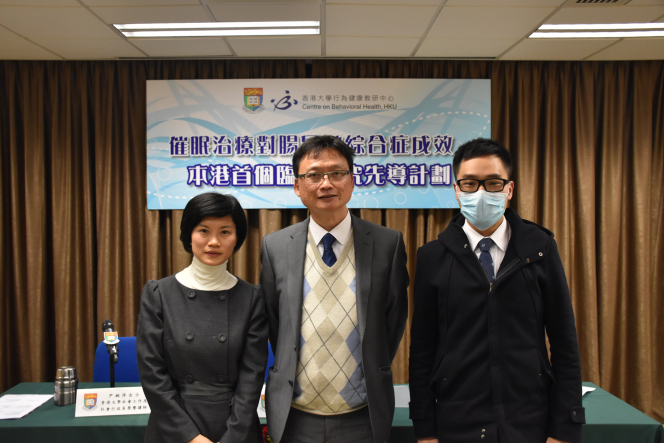Media
The HKU Centre on Behavioral Health releases pilot study findings on Hypnotherapy and Irritable Bowel Syndrome
28 Jan 2016
It is common that Hong Kong people might have experiences of disordered defecation with unknown reason, such as diarrhea and constipation. It is also easy to observe that abdominal discomforts often come along with stress. Emotion disturbance and stress might affect our intestinal functions. The alarm system of our body has been already turned on and expressed as features of Irritable Bowel Syndrome (IBS). Dr. Siu-man Ng, Associate Professor, Department of Social Work and Social Administration, The University of Hong Kong, points out that the aetiology of IBS is not entirely clear. The cause might be related to intestinal abnormality, for examples, congenital visceral hypersensitivity and long-term stress. It induces a series of symptoms that triggering by the visceral functional disorder. It is estimated that the point prevalence of IBS among adults in Hong Kong is about 7%. IBS tends to run a chronic course, and so far there is no satisfactory treatment for it.
In view of the situation mentioned above, the Centre on Behavioral Health at the University of Hong Kong conducted a pioneer study on hypnotherapy for IBS in 2012-2013. It aimed at exploring an alternative therapy for the persons suffering from IBS. There were totally 15 subjects with IBS recruited in the study. The intervention included a series of hypnotherapy groups led by registered social worker with professional hypnotherapy training. It taught the subjects to practice self-hypnosis in order to tackle the symptoms of IBS. It was a 4-session weekly group. Each session lasted for 3 hours.
The results of the pilot study were highlighted as follows (please click here for the tables of findings):
-
Significant relief on IBS symptoms but further investigation on hypnotherapy for different types of IBS should be pursued.
It was found that the symptoms of IBS were greatly improved after the therapy. The severity of symptoms was measured through standardized assessment scales. The statistics showed that the score was dramatically dropped from 26.4 at pre-treatment to 14.3 at post-treatment (Score “0”represents no symptom, and the total score “50”indicates the recurrence of symptoms). The reduction rate was approximately to 50%.
Among those results, the improvement concerning the influence of bloating to daily life was obvious. However, the pilot study suggested that the responses of different type of IBS, for examples, IBS – constipation type, IBS- mix type, were deserved to be further explored. It was because this pilot study was dominant by the subjects with IBS diarrhea type. -
Significant increase on the mental health index but the mechanism of change needs further evaluation.
The mental component score increased significantly from 35.73 at pre-pretreatment to 43.75 at post-treatment [t(14)=-2.69, p=.02]. There was association between IBS and emotions. Nevertheless, the mechanism of change is not entirely clear and needs further investigation. -
Improvement persisted after intervention but critical factors for recovery await further investigation
The IBS symptoms severity score further reduced to 8.08 three months after completion of the hypnotherapy group. However the critical factors for full recovery have not been clearly identified. In this regard further larger-scale studies are worth pursuing.
Taking all these into consideration, the Centre on Behavioral Health will launch a more rigorous study in 2016 - An outcome study on hypnotherapy for IBS: a randomized control trial. The efficacy of the intervention will be further evaluated. With a bigger sample size and stronger experimental design, the underlying mechanism can also be examined. (Please click here for the programme and application information.)
For media enquiries, please contact Miss Amy Choi, Senior Executive Assistant at 2831 5163 or by email: amychoi@hku.hk .
For enquires about the study, please contact Pauline WAN, the Honorary Lecturer at 2317 1383 or by email: ypwan@hku.hk.

